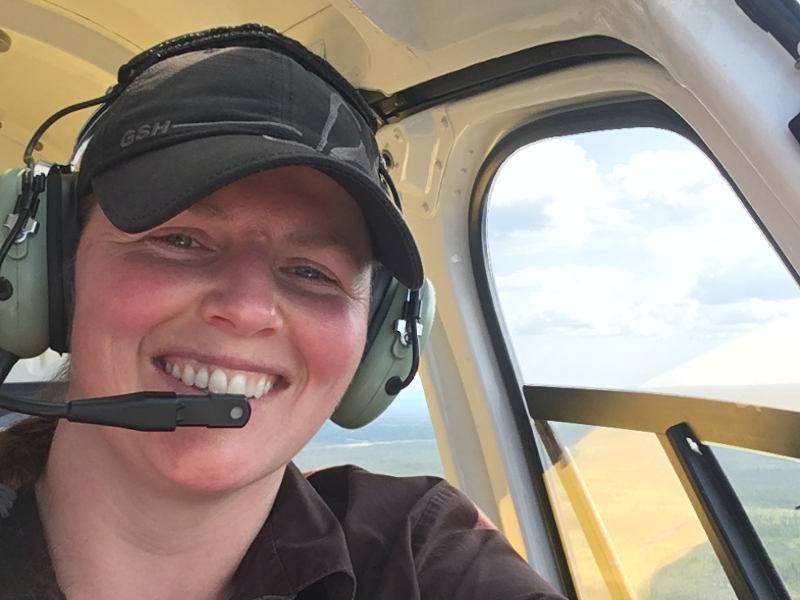
Features
MRO
Safety & Training
Helicopter maintenance and mentorship
July 16, 2020 By Kendra Kincade
Crystalle Laamanen describes her AME career and passion for teaching
 Crystalle Laamanen, Aircraft Maintenance Engineer, and instructor with Nova Scotia Community College’s aircraft maintenance program.
Crystalle Laamanen, Aircraft Maintenance Engineer, and instructor with Nova Scotia Community College’s aircraft maintenance program. I fell in love with helicopters just recently when I became involved with the 417 Helicopter Squadron in Cold Lake. One of the things that caught my attention was the amount of maintenance that goes into making sure the helicopters are safe to fly. So, I decided to explore this world of helicopter maintenance a little more and discovered a lady by the name of Crystalle Laamanen.
Laamanen is an Aircraft Maintenance Engineer (AME) who loves to share her passion for working on helicopters. She graduated from Canadore College’s aircraft maintenance program when she was just 19 years of age. After graduation, she was relocated to Yellowknife, NWT, to work as a helicopter mechanic. Following her true passion, she later moved to Nova Scotia to become an Instructor at NSCC where she is currently still instructing. Not able to quite leave the operational work behind, Laamanen also does AME contract work in northern Canada during the summer. I called Laamanen to find out more about her career as a helicopter AME.
What made you want to be a helicopter AME?
I don’t really have a glory story to answer this, to be honest. I took an interest in helicopters as most kids do. I grew up in the era of Matlock and The Beachcombers – both shows had helicopters in them. I can also remember talking to a guidance counselor in high school and trying to discuss what direction I should go after school. Her ideas sounded boring to me; and I had thought about being a helicopter paramedic and also a helicopter mechanic. When I brought that idea forward, I was met with “You do realize you are a girl, right.” My mind was made up!
Why do you enjoy teaching?
I wanted to be a teacher to help the industry. I had a great mentor at Canadore. He was my helicopter teacher and a large part of why I was successful and why I chose the helicopter field work route in aviation. I wanted to inspire others as he had inspired me. My favourite part of teaching is watching the confidence change from day one through until graduation. There are usually 100 to 150 students in our school and I teach the helicopter modules along with Publications, Human Factors, and a few others.
Why does mentorship matter to you?
I think mentorship is crucial for attracting and keeping young people – men or women – in the industry. Many young adults do not currently come to the trades programs with the experience that would be beneficial for them to succeed. They lack skills and, therefor, they lack confidence. If we can mentor them and help build their confidence, it will help them get closer to the comfort zone and they will be more likely to stay, improve and be great AMEs. I had many great mentors along the way and each one has helped me to grow, succeed; and given me the knowledge and confidence to carry on.
Do men and women learn differently?
There are many ways that people learn. What works for some may not necessarily work for others. The gender doesn’t necessarily determine that. Whether you are a visual (learn by seeing), auditory (learn by hearing), or kinesthetic (learn by doing) learner, it comes down to the individual and not the gender. As with anything, in order to learn it you need to have interest in the subject matter. It doesn’t matter who you are, how you learn, or if you are a man or a woman, if it doesn’t interest you, learning it will be very difficult.
Why are there not more female AMEs?
I have been asked this question many times in my 20-plus years in the industry and I think the answers often are too complicated. My answer is simple: It doesn’t matter if you are a man or a woman, you need to have an interest in that line of work to do the job. There are more women who are estheticians – why? Because more women are interested in that trade than men. It’s the same thing. I grew up on a farm and I am a tomboy at heart. There is nothing saying girls can’t be AMEs, it is just not a lifestyle that interests all females – or males.
Do you believe COVID will have a massive affect on the shortage of AMEs?
I believe the shortage is going to be worse as operations get back up and running throughout the industry. Some schools have slowed intakes and graduates will be less. Many Baby Boomers who were laid off, or were home due to COVID, will be retiring or taking early retirement and the shortage gap will widen. The industry needs more AMEs and the only way to fix that is to teach and train and graduate more students.
The problem is not going away anytime soon and I absolutely feel AME is still a smart career choice. Most programs are two years long and, by the time the newest intakes graduate, the industry will likely be ramping back up. Will it be at 100 per cent – No. Will it get there – Yes. When it does get there, will we undoubtedly need more people trained than ever before.